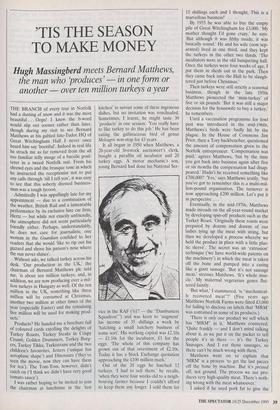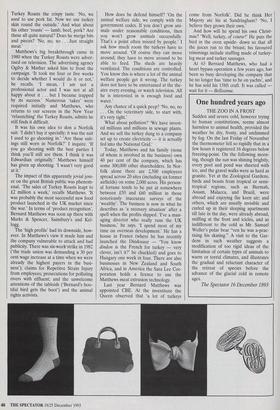'TIS THE SEASON TO MAKE MONEY
Hugh Massingberd meets Bernard Matthews,
the man who 'produces' — in one form or another — over ten million turkeys a year
THE BRANCH of every tree in Norfolk had a dusting of snow and it was the most beautiful ... Oops! I knew the b-word would slip out sooner rather than later, though during my visit to see Bernard Matthews at his gabled late-Tudor HQ of Great Witchingham Hall I never once heard him say 'bootifur Indeed in real life he struck me as far removed from the all too familiar telly image of a bucolic poul- terer in a tweed Norfolk suit. From his shrewd eyes and the brusque tone in which he instructed the receptionist not to put any calls through 'till I tell you', it was easy to see that this soberly dressed business- man was a tough tycoon. Admittedly I was appallingly late for my appointment — due to a combination of the weather, British Rail and a lamentable performance by its exclusive hire car firm, Hertz — but while not exactly unfriendly, the atmosphere did not seem particularly friendly either. Perhaps, understandably, he does not care for journalists; one woman in the Guardian confided to her readers that she would 'like to rip out his gizzard and shove his parson's nose where the sun never shines'.
Without ado, we talked turkey across his desk. 'Our production in the UK,' the chairman of Bernard Matthews plc told me, 'is about ten million turkeys, and, in addition, we are now producing over a mil- lion turkeys in Hungary as well. Of the ten million in the UK, something like three million will be consumed at Christmas, another two million at other times of the year (especially Easter) and the remaining five million will be used for making prod- ucts.'
Products? He handed me a brochure full of coloured cards extolling the delights of Turkey Roasts, Turkey Steaks in Crispy Crumb, Golden Drummers, Turkey Burg- ers, Turkey Tikka, Turkistrami and the two children's favourites, Jetters (unique fun aeroplane shape') and Dinosaurs (`they've seen the movie, now they can have them for tea'). The Tom-Tom, however, didn't catch on CI think we didn't have very good tomato sauce'). I was rather hoping to be invited to join the chairman at lunchtime in the 'test
kitchen' to savour some of these ingenious dishes, but no invitation was vouchsafed. Sometimes, I learnt, he might taste 30 `products' in one session: 'You really have to like turkey to do this job.' He has been eating the gallinaceous bird of genus Meleagris non-stop for 43 years.
It all began in 1950 when Matthews, a 20-year-old livestock auctioneer's clerk, bought a paraffin oil incubator and 20 turkey eggs. A motor mechanic's son, young Bernard had done his National Ser- vice in the RAF (`617 — the "Dambusters Squadron"') and was keen to 'augment' his income of 35 shillings a week by `hatching a small hatchery business of some sort'. His working capital was £2.10s — £1.10s for the incubator, £1 for the eggs: 'The whole of this company has grown out of that investment of £2.10s. Today it has a Stock Exchange quotation approaching the £100 million mark.'
Out of the 20 eggs he hatched 12 turkeys. 'I had to sell them,' he recalls, `when they were four weeks old to a neigh- bouring farmer because I couldn't afford to keep them any longer. I sold them for 15 shillings each and I thought, This is a marvellous business!'
By 1955 he was able to buy the empty pile of Great Witchingham for £3,000. 'My mother thought I'd gone crazy,' he says. `But although it was filthy inside, it was basically sound.' He and his wife (now sep- arated) lived in one third, and they kept the turkeys in the other two thirds. 'The incubators were in the old banqueting hall. Once the turkeys were four weeks of age, I put them in sheds out in the park. Then they came back into the Hall to be slaugh- tered just before Christmas.'
Then turkeys were still strictly a seasonal business, though in the late 1950s Matthews pioneered the 'mini-turkey' of five or six pounds. 'But it was still a major decision for the housewife to buy a turkey,' he remembers.
Until a vaccination programme for fowl pest was introduced in the mid-1960s, Matthews's birds were badly hit by the plague. In the House of Commons Jim Prior, then a Tory backbencher, questioned the amount of compensation given to the Norfolk entrepreneur. 'Compensation was paid,' agrees Matthews, tut by the time you got back into business again after five or six months the compensation had disap- peared.' Hadn't he received something like £700,000? 'Yes,' says Matthews testily, 'but you've got to remember this is a multi-mil- lion-pound organisation. The turnover is now approaching £200 million. Let's put it in perspective . . '
Eventually, in the mid-1970s, Matthews made inroads on the all-year-round market by developing spin-off products such as the Turkey Roast. 'Originally these roasts were prepared by dozens and dozens of our ladies tying up the meat with string, but then we developed a process whereby we held the product in place with a little plas- tic sleeve'. The secret was an 'extrusion' technique (`we have world-wide patents on the machinery') in which the meat is taken off the bone and pumped into a casing like a giant sausage. 'But it's not sausage meat,' stresses Matthews. 'It's whole mus- cle.' My maternal vegetarian genes flut- tered faintly.
`But what,' I stammered, 'is "mechanical- ly recovered meat"?' (Five years ago Matthews Norfolk Farms were fined £3,000 for failing to disclose on labels that `MRM' was contained in some of its products.)
`There is only one product we sell which has "MRM" in it,' Matthews countered. `Quite frankly — and I don't mind talking about it, as we put it on the packet to tell people it's in there — it's the Turkey Sausages. And I eat those sausages, so there can't be much wrong with them.'
Matthews went on to explain that `MRM' is a process 'to get the last pieces off the bone by machine. But it's pressed off, not ground. The process we use pro- duces very high-quality meat. There's noth- ing wrong with the meat whatsoever.'
I asked if he used pork fat to give the Turkey Roasts the crispy taste. 'No, we used to use pork fat. Now we use turkey skin round the outside.' And what about his other 'roasts' — lamb, beef, pork? Are these all quite natural? Does he merge bits and pieces? `No, no, no . . Just straight meat.'
Matthews's big breakthrough came in 1980 when the Turkey Roasts were adver- tised on television. The advertising agency Ogilvy & Mather asked him to front the campaign. 'It took me four or five weeks to decide whether I would do it or not,' he recalls. 'I mean, I am not a professional actor and I was not at all happy about it . . but I became trapped by its success.' Numerous 'takes' were required initially and Matthews, who returns to our screens in the New Year `relaunching' the Turkey Roasts, admits he still finds it difficult.
It was his own idea to don a Norfolk suit. 'I didn't buy it specially; it was the suit I used to go shooting in.' Are these suit- ings still worn in Norfolk?' I inquire. 'If you go shooting with the best parties I think you'll still see them. I think it was Edwardian originally.' Matthews himself has given up shooting: 'I wasn't very good at it.'
The impact of this apparently jovial joss- er on the great British public was phenom- enal. 'The sales of Turkey Roasts leapt to £2 million a week,' recalls Matthews. 'It was probably the most successful new food product launched in the UK market since the war.' In terms of 'product recognition', Bernard Matthews was soon up there with Marks & Spencer, Sainsbury's and Kel- logg.
The 'high profile' had its downside, how- ever. In Matthews's view it made him and the company vulnerable to attack and bad publicity. There was six-week'strike in 1982 (`the trade union was demanding a 30 per cent wage increase at a time when we were already the highest payers in the busi- ness'); claims for Repetitve Strain Injury from employees; prosecutions for polluting rivers with effluent; and the unwelcome attentions of the tabloids (`Bernard's boo- tiful bird gets the boot') and the animal rights activists. How does he defend himself? 'On the animal welfare side, we comply with the government codes. If you don't grow ani- mals under reasonable conditions, then you won't grow animals successfully. That's a point often missed by people.' I ask how much room the turkeys have to move around. 'Of course they can move around; they have to move around to be able to feed. The sheds are heavily ventilated. The conditions are controlled. You know this is where a lot of the animal welfare people get it wrong. The turkey does not have to be entertained at the the- atre every evening, or watch television. All he is interested in is enough food and water.'
Any chance of a quick peep? 'No, no, no . . . On the veterinary side, to start with, it's very tight.'
What about pollution? 'We have invest- ed millions and millions in sewage plants. And we sell the turkey dung to a company set up to create electricity — it is actually fed into the National Grid.'
Today, Matthews and his family (none of whom is involved in the business) own 40 per cent of the company, which has some 300,000 other shareholders. In Nor- folk alone there are 2,500 employees spread across 20 sites (including six former airfields) on some 2,000 acres. flis person- al fortune tends to be put at somewhere between £50 and £60 million in those notoriously inaccurate surveys of the `wealthy'. The business is now in what he describes as 'a recovery situation' after a spell when the profits slipped. 'I've a man- aging director who really runs the UK business,' he says. 'I spend most of my time on overseas development.' He has a house in France (where he has recently launched the Dindosaur — 'You know dindon is the French for turkey — very clever, isn't it?' he chuckled) and goes to Hungary one week in four. There are also businesses in New Zealand and South Africa, and in America the Sara Lee Cor- poration holds a licence to use the Matthews meat extrusion technology.
Last year Bernard Matthews was appointed CBE. At the investiture the Queen observed that 'a lot of turkeys come from Norfolk'. Did he think Her Majesty ate his at Sandringham? 'No, I believe they grown their own.'
And how will he spend his own Christ- mas? 'Well, turkey, of course!' He puts the bird in the oven upside- down so that all the juices run to the breast; his favoured trimmings include stuffing made of turkey- leg meat and turkey sausages.
At 63 Bernard Matthews, who had a heart bypass operation a few years ago, has been so busy developing the company that he no longer has 'time to be on yachts', and he has sold his 158ft craft. It was called wait for it — Bellissima.











































































































 Previous page
Previous page